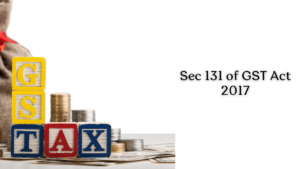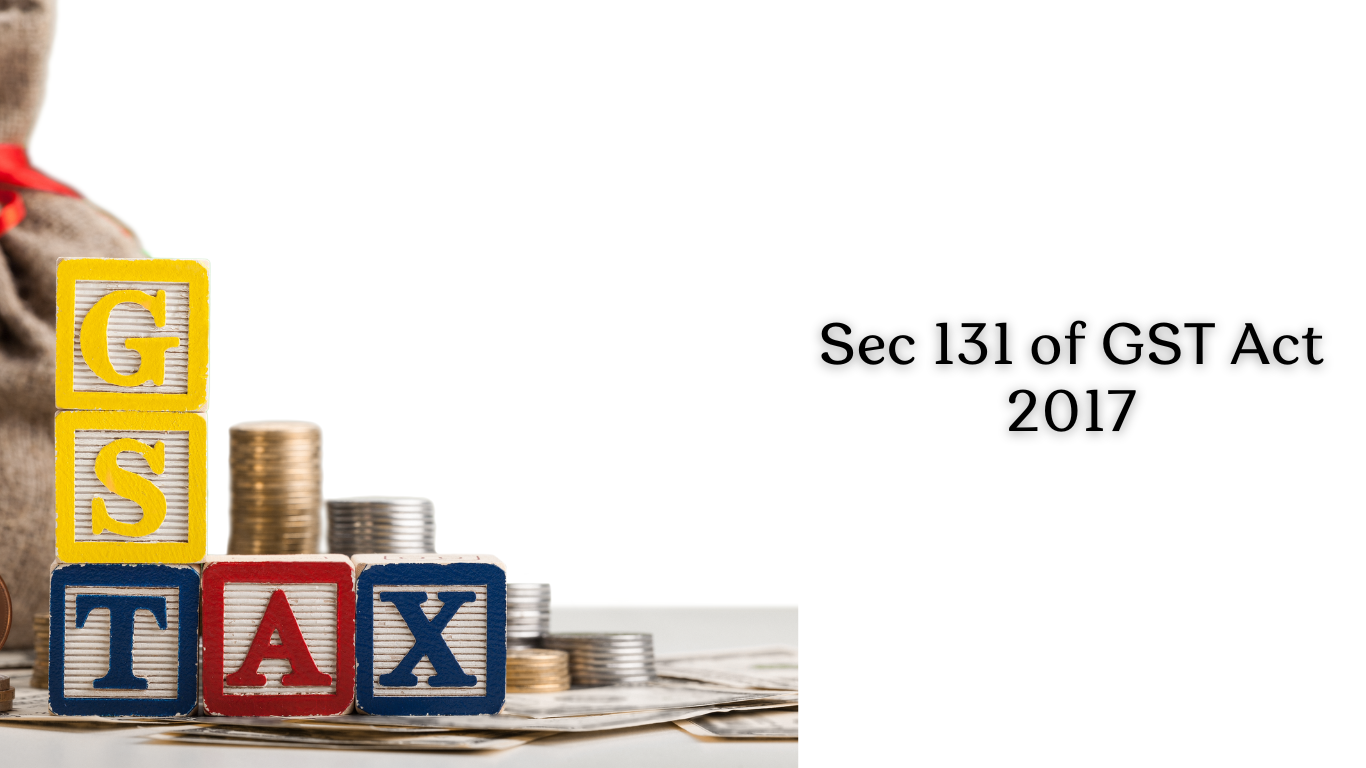Sec 131 of GST Act 2017
126(1) No officer under this Act shall levy any penalty for minor violations of tax regulations or procedural requirements. Sec 131 of GST Act 2017 This includes any omission or mistake in documentation that is easily correctable and made without fraudulent intent or gross negligence.
Explanation: For the purpose of this subsection:
(a) A breach shall be deemed a ‘minor breach’ if the amount of tax involved is less than five thousand rupees.
(b) An omission or mistake in documentation shall be considered easily rectifiable if the error is apparent on the face of the record.
(2) Sec 131 of GST Act 2017 The penalty imposed under this Act will vary based on the facts and circumstances of each case and will be proportional to the extent and seriousness of the violation.
(3) No penalty shall be levied on any individual without affording them an opportunity to be heard.
(4) The officer under this Act shall, when imposing a penalty in an order for a violation of any law, regulation, or procedural requirement, specify the nature of the violation and the relevant law, regulation, or procedure under which the penalty amount for the violation has been determined.
(5) If an individual voluntarily discloses to an officer under this Act the circumstances of a breach of the tax law, regulation, or procedural requirement before Sec 131 of GST Act 2017 the officer discovers the breach, the proper officer may take this into account as a mitigating factor when determining the penalty for that individual.
(6) The provisions of this section shall not be applicable in cases where the penalty specified under this Act is either a fixed sum or expressed as a fixed percentage.

Sec 127-Power to impose penalty in certain cases.
If the proper officer determines that a person is subject to a penalty and such penalty is not covered under any proceedings specified in section 62, section 63, section 64, section 73, section 74, section 129, or section 130, the officer may issue an order imposing such penalty after providing a reasonable opportunity for the person to be heard.
Sec 128 – Power to waive penalty or fee or both.
The Government may, through notification, partially or fully waive any penalty mentioned in section 122, section 123, or section 125, or any late fee specified in section 47 for a certain class of taxpayers and under specific mitigating circumstances as outlined therein, based on the recommendations of the Council.
Sec 129 – Detention, seizure, and release of goods and conveyances in transit.
- (1) Despite anything contained in this Act, if any person transports or stores any goods while they are in transit in violation of the provisions of this Act or the rules made thereunder, all such goods, conveyances used to transport the said goods, and documents related to such goods and conveyances shall be liable to detention or seizure. Sec 131 of GST Act 2017 After detention or seizure, they shall be released under the following conditions:
(a) Upon payment of the applicable tax and penalty equal to one hundred percent of the tax payable on such goods, and in Sec 131 of GST Act 2017 the case of exempted goods, upon payment of an amount equal to two percent of the value of goods or twenty-five thousand rupees, whichever is lower, if the owner of the goods comes forward to pay such tax and penalty.
(b) Upon payment of the applicable tax and penalty equal to fifty percent of the value of the goods, reduced by the tax amount already paid thereon. Sec 131 of GST Act 2017 In the case of exempted goods, upon Sec 131 of GST Act 2017 payment of an amount equal to five percent of the value of goods or twenty-five thousand rupees, whichever is lower, if the owner of the goods does not come forward to pay such tax and penalty.
(c) Upon providing security equivalent to the amount payable under clause (a) or clause (b) in a form and manner as prescribed.
Provided that no goods or conveyance shall be detained or seized without serving an order of detention or seizure on the person transporting the goods.
(2) The provisions of subsection (6) of section 67 shall apply, with necessary changes, for the detention and seizure of goods and conveyances.
(3) The appropriate officer who detains or seizes goods or conveyances shall issue a notice specifying the tax and penalty to be paid. Afterwards, an order shall be issued for the payment of tax and penalty under clause (a), (b), or (c).
(4) No tax, interest, or penalty shall be determined under subsection (3) without affording the person concerned an opportunity to be heard.
(5) Upon payment of the amount referred to in subsection (1), all proceedings regarding the notice specified in subsection (3) shall be considered concluded.
(6) If the person transporting any goods or the owner of the goods fails to pay the amount of tax and penalty as stipulated in subsection (1) within seven days of such detention or seizure, further proceedings shall be initiated in accordance with the provisions of section 130.
Provided that if the detained or seized goods are perishable or hazardous in nature, or if they are likely to depreciate in value with Sec 131 of GST Act 2017 the passage of time, the period of seven days may be shortened by the proper officer.
Section 130 deals with the confiscation of goods or conveyances and the imposition of penalties.
- (1) Despite anything contained in this Act, if any person:
(i) Supplies or receives any goods in violation of any provisions of this Act or the rules made thereunder with the intention to evade payment of tax; or
(ii) Fails to account for any goods for which he is liable to pay tax under this Act; or
(iii) Supplies any goods liable to tax under this Act without having applied for registration; or
(iv) Contravenes any of the provisions of this Act or the rules made thereunder with the intention to evade payment of tax; or
(v) Uses any conveyance as a means of transport for the carriage of goods in contravention of the provisions of this Act or the rules made thereunder, unless the owner of Sec 131 of GST Act 2017 the conveyance proves that it was used without the knowledge or connivance of the owner himself, his agent, if any, and the person in charge of the conveyance,
then, all such goods or conveyances shall be liable to confiscation, and the person shall be liable to penalty under section 122.
(2) Whenever confiscation of any goods or conveyance is authorised by this Act, the adjudicating officer shall provide the owner of the goods with the option to pay, in lieu of confiscation, such fine as the said officer deems appropriate.
Provided also that if any such conveyance is used for the transportation of goods or passengers for hire, the owner of the conveyance shall be offered the option to pay, instead of confiscation of the conveyance, a fine equal to the tax payable on the goods being transported on it.
(3) When any fine in lieu of confiscation of goods or conveyance is imposed under subsection (2), the owner of such goods or conveyance or Sec 131 of GST Act 2017 the person mentioned in subsection (1) shall, in addition, be liable for any tax, penalty, and charges payable concerning such goods or conveyance.
(4) No order for confiscation of goods or conveyance or for the imposition of a penalty shall be issued without affording the person an opportunity to be heard.
(5) When any goods or conveyance are confiscated under this Act, the ownership of such goods or conveyance shall then belong to the Government.
(6) The proper officer adjudging confiscation shall take and retain possession of the confiscated items, Sec 131 of GST Act 2017 and every police officer, upon the request of such proper officer, shall assist in taking and retaining such possession.
(7) After ensuring that the confiscated goods or conveyance are not needed in any other proceedings under this Act and after providing a reasonable time not exceeding three months to pay the fine in lieu of confiscation, Sec 131 of GST Act 2017 the proper officer may dispose of such goods or conveyance and deposit the proceeds from the sale with the Government.
Sources : https://mahagst.gov.in/en/mgst-act-2017-chapter-xix
For More Information : https://taxgyany.com/

